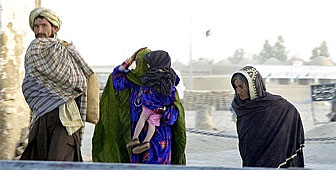Aid agencies brace for humanitarian catastrophe in Afghanistan

Millions of Afghans are facing starvation during the coming winter because of disruptions to food supplies following the United States strikes, aid agencies have warned. The United Nations says some six million Afghans are either fully or partially dependent on food aid.
The head of the Swiss government’s development agency in Pakistan, Rudolf Hager, told swissinfo that “a humanitarian catastrophe is now unavoidable. We are talking about six to seven million people who are in danger of starving to death”.
He added that since the US and British air strikes began on Sunday night, it had become impossible to deliver vital food supplies. “In four to six weeks, it will start to snow. It will then become virtually impossible for deliveries to reach outlying regions.
Hager also dismissed US airdrops of food as essentially useless. “They are being done for propaganda purposes,” he said.
Not enough camps
Geneva-based aid agencies say there is no evidence yet of a massive exodus of civilians from Afghan cities, following Sunday’s air strikes. They say it could be several days before it is known what impact the attacks have had on refugee numbers.
But the United Nations refugee agency warned that existing camps in neighbouring countries might be insufficient to accommodate deal large numbers of refugees.
The UN has warned that as many as 1.5 million Afghans might try to flee the country, but it is too early to tell if that figure will materialise. The number of people fleeing as a result of the US-led strikes might be smaller than feared simply because many civilians left the cities before the attacks.
“People are not massing at the border,” says Kris Janowski, spokesman for the Geneva-based Office of the United Nations High Commission for Refugees. He pointed out that it might take several days for people fleeing Kabul, Kandahar or Jalalabad to reach the Pakistani frontier.
According to unconfirmed reports from inside Afghanistan, many civilians appeared to be heading towards the border with Iran, the Geneva-based UNHCR said.
Exodus from cities
The International Committee of the Red Cross, which is in contact with 1,000 Afghan staff operating in the country, said that since the attacks people had been leaving cities – especially Kabul and Kandahar – and moving towards the villages.
“But our staff did not report any massive movement of the population,” says ICRC spokeswoman Macarena Aguilar.
The ICRC is concentrating its efforts on providing medical assistance in the main cities. But a major worry is how to get food and medicines to the tens of thousands of people who have fled to Afghanistan’s mountainous and often inaccessible countryside.
“It’s also a big concern for us that people moving outside the cities are at risk from landmines,” Aguilar says.
Logistical nightmare
Many Afghans are expected to try to join the millions of their compatriots who have sought the haven of a neighbouring country over the past 20 years of conflict.
The UNHCR has set up camps along the Pakistani-Afghan border in anticipation of an influx of refugees. It says it could give food and shelter to up to 100,000 refugees, “with some difficulty”.
However, these makeshift camps are in inaccessible, semi-autonomous tribal areas, and are unlikely to be enough to cope: “Logistics in these areas is an absolute nightmare,” Janowski said.
The UNHCR has asked the Pakistani government to be “patient and flexible”, and to make available camps further inland from the border where infrastructure and water supplies are better.
“We don’t have enough adequate sites, and if large numbers of people arrive, it’ll be extremely difficult, unless these people are allowed deeper into Pakistan,” Janowski says.
“At the moment, the scale of the problem is anyone’s guess,” he adds.
Inside Afghanistan, the humanitarian situation was expected to deteriorate after the UN’s World Food Programme said it had halted its operations there.
The spokeswoman for the WFP’s Geneva office, Christiane Berthiaume, said the UN agency was evaluating the impact of Sunday’s air strikes, and said in the meantime, no more food was being taken into Afghanistan and none of the supplies already inside the country were being distributed.
by Roy Probert

In compliance with the JTI standards
More: SWI swissinfo.ch certified by the Journalism Trust Initiative








You can find an overview of ongoing debates with our journalists here . Please join us!
If you want to start a conversation about a topic raised in this article or want to report factual errors, email us at english@swissinfo.ch.